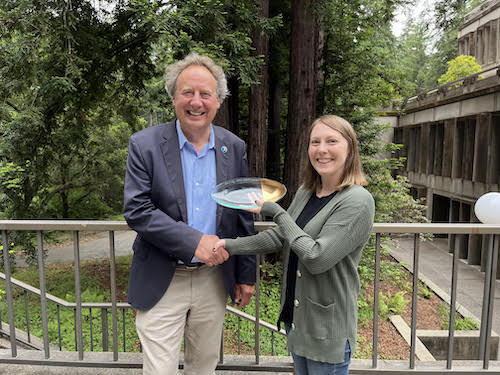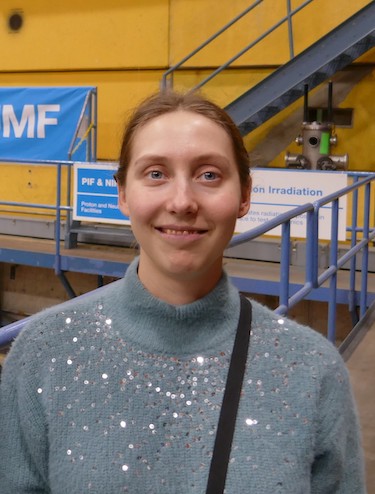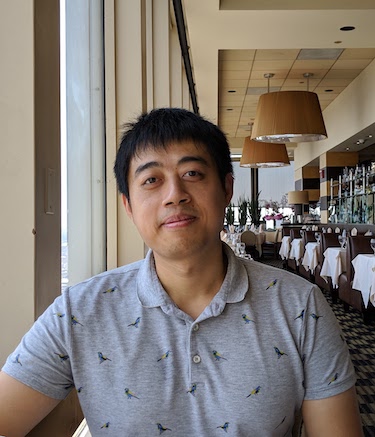Campus News
UC Santa Cruz celebrates National Postdoc Appreciation Week
Postdoctoral scholars at UC Santa Cruz participate in cutting-edge research while in this ultimate phase of their academic training. Many are preparing to enter the academy, while some are preparing for non-academic careers or professions that merge the two domains.

Postdoctoral scholars at UC Santa Cruz participate in cutting-edge research while in this ultimate phase of their academic training. Many are preparing to enter the academy, while some are preparing for non-academic careers or professions that merge the two domains. They are active in bringing grant funding to the university, and along with that, the attention of other research institutions, government, and industries involved in their fields of study.
Emily Lovell (Baskin Engineering)
Double UC Santa Cruz alumna Emily Lovell (B.A., Computer Science, ‘08; Ph.D., Computer Science, ‘21) has made significant contributions to the field of computer science and engineering since joining Baskin Engineering as a postdoctoral fellow in 2022.
Recognizing her impactful work in teaching and research, Lovell received a 2024 Graduate Division Outstanding Postdoctoral Scholar Award. The award also went to John Dzimianski, a Biomolecular Engineering and Bioinformatics postdoc.
Lovell’s work focuses on open source software contributions, and teaching open source as a way to support broader participation in computing. She is advised by James Davis, Professor of Computer Science and Engineering.
“A lot of my work is driven by my personal experience. I found computer science late, and I think this was due to not having the same opportunities or exposure as some of my peers who came from more historically represented demographics,” Lovell said.
Now, Lovell is committed to making the field of computer science more inclusive and diverse. During her postdoc, she piloted the Contributor Catalyst program, which invites students from Historically Black Colleges and Universities (HBCUs) to learn about open source and contribute to an open source project throughout the summer. Modeled on Lovell’s prior teaching and research, the program reflects a need identified by UCSC’s Open Source Program Office (OSPO) HBCU faculty partner at Norfolk State University.
“I’m part of the UCSC OSPO team and one of the most motivating aspects of this work is how community-based it is. Finding open source and working to make the field of computing more diverse helped me see how people can work together in a way that’s uplifting everyone,” Lovell said.
Initial funding for the program came from Baskin Engineering, with continued support from Marcella Gomez, Associate Professor of Applied Mathematics and Associate Dean for Diversity, Equity and Inclusion.
Now, Lovell has secured a $1 million National Science Foundation grant to expand the program.
“This funding will allow us to partner with five more HBCUs over the next three years, growing to a cohort size of over 20 students. I owe the success of the program to our HBCU faculty partner and to the original cohort of students who were willing to take the risk and participate,” she said.
Reflecting on her postdoc, Lovell takes pride in how the program has empowered students to advance their careers in computer science
“Seeing my students stay involved, say yes to things, take their own risks and grow so much is the best part of my work.”
Read more about Emily in this Voices of Baskin Engineering piece.
Jennifer Ott (Science Division)
Jennifer Ott is a postdoctoral research er at the Santa Cruz Institute for Particle Physics (SCIPP), where she focuses on particle-detection instrumentation and its creation and development. In this area, she is rapidly developing into a world-class expert and sought-after consultant for ideas and advice, according to distinguished physics professor Bruce Schumm.
er at the Santa Cruz Institute for Particle Physics (SCIPP), where she focuses on particle-detection instrumentation and its creation and development. In this area, she is rapidly developing into a world-class expert and sought-after consultant for ideas and advice, according to distinguished physics professor Bruce Schumm.
The bulk of Ott’s work at SCIPP has been in Schumm’s Fast Sensors Group, where she has done impressive work on precision solid-state timing detectors, geared towards applications in nuclear and particle physics. This work requires concurrent advances in both sensor technology and electronic readout, and their integration—and she has been pushing all of these forward with great skill, according to Schumm.
“She has become one of the main forces in our sensor characterization effort,” he said, “directing laboratory staff and leading a sizable group of students in a substantial effort to provide feedback on sensor and electronics performance to industrial partners developing these components, and providing critical advice and perspective on how to improve and optimize them.”
Ott is also contributing to the quality control of pixel-detector modules for the future upgrade of the ATLAS Experiment at the Large Hadron Collider. Speaking for herself, Ott said she enjoys that she as a postdoc gets to pursue her own research interests—such as versatile-detector R&D—instead of always having to consider alignment with a thesis topic.
At the same time, Ott said UC Santa Cruz was an ideal place to be a particle physics postdoc, both because of its prolific reputation in the field, and because of a campus culture instilled with academic ambition but also real respect for work-life balance. She has also been an active member of the UC Santa Cruz Postdoc Association, which aims to provide career training and resources to postdoctoral scholars and foster a welcoming environment.
In January, Ott will join the faculty of the University of Hawaiʻi at Mānoa.
Maryam Moarefian (Baskin Engineering)
 Maryam Moarefian is a postdoctoral scholar with the interdisciplinary Braingeneers research group. An engineer by training, Moarefian now works closely with colleagues in the biological sciences to create platforms for growing cerebral organoids, which are miniature, three-dimensional models of brain tissue grown from stem cells. Her contributions are helping the Braingeneers to scale up their studies on the genetics of how neural connections form, and the underpinnings of certain neurological conditions.
Maryam Moarefian is a postdoctoral scholar with the interdisciplinary Braingeneers research group. An engineer by training, Moarefian now works closely with colleagues in the biological sciences to create platforms for growing cerebral organoids, which are miniature, three-dimensional models of brain tissue grown from stem cells. Her contributions are helping the Braingeneers to scale up their studies on the genetics of how neural connections form, and the underpinnings of certain neurological conditions.
“At UCSC, I’ve observed strong collaboration between biologists and engineers, particularly within the Braingeneers group,” said Moarefian. “This is what excited me to join, as there are no barriers between engineering and biological labs. Biologists work closely with engineers, providing samples and everything needed to test the innovative platforms we’re developing. They seek a quick transition to use these platforms to address their biological questions, making it an ideal environment for me.”
Read more about Moarefian and her exciting organoid research on the Genomics Institute website.
Zhoujian Zhang (Science Division)
 Zhoujian (ZJ) Zhang, a postdoctoral researcher in astronomy and astrophysics, has demonstrated excellence in research, mentorship and service. Leveraging state-of-the-art observational resources and theoretical frameworks, Zhang’s work aims to advance our understanding of the atmospheres, formation, and evolution of extrasolar planets and their “suns.” Leading international collaborations spanning various institutions, Zhang has published 11 first-author peer-reviewed papers in high-impact journals, and to date, authored or co-authored over 40 peer-reviewed publications.
Zhoujian (ZJ) Zhang, a postdoctoral researcher in astronomy and astrophysics, has demonstrated excellence in research, mentorship and service. Leveraging state-of-the-art observational resources and theoretical frameworks, Zhang’s work aims to advance our understanding of the atmospheres, formation, and evolution of extrasolar planets and their “suns.” Leading international collaborations spanning various institutions, Zhang has published 11 first-author peer-reviewed papers in high-impact journals, and to date, authored or co-authored over 40 peer-reviewed publications.
Additionally, he has led multiple successful proposals that request observing time using competitive ground-based and space-based telescopes. His contributions have also been recognized through scholarly distinctions. These include the NASA Sagan fellowship, grants awarded by UC Santa Cruz and the Heising-Simons Foundation, the Chambliss Astronomy Achievement Student Award from the American Astronomical Society (AAS), and other university and department-level honors.
Moreover, Zhang’s expertise has been applied across diverse domains. This includes serving as a referee for publications and reviewing applications for NASA grants and telescope proposals. Additionally, he has been invited to present 16 colloquia at other institutions.
As an educator, Zhang is committed to providing psychosocial and career support to his students. His teaching philosophy centers on creating inspiring and adaptive environments in which his students can develop into self-regulated learners and cultivate strong STEM identities. At UC Santa Cruz, he has mentored students, designed class projects aimed at fostering independent study and collaboration, and has served as a section lecturer and TA for undergraduate-level courses.
In terms of service, Zhang organizes the weekly Planetary Lunch seminar (PLUNCH) in the Department of Astronomy and Astrophysics. He has invited early-career scientists from various institutions to present their research and engage with local astronomers.
Zhang also co-leads the Astronomy Mentorship Program for Upcoming Postdocs, which is dedicated to empowering current and former postdoctoral prize fellows to offer professional guidance to senior graduate students and junior postdocs in astronomy. The program has a particular emphasis on individuals who lack access to the resources available to independent prize fellows, with the goal of improving the diversity of postdoc prize fellows.
On the heels of National Postdoc Appreciation Week, UC Santa Cruz will celebrate postdocs’ contributions to and enrichment of our campus with Postdoctoberfest.